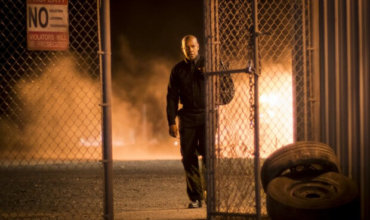Hollywood, 1969. Rick Dalton (Leonardo DiCaprio), the former television star from the 1950s Western series Bounty Law is looking to turn around his fading career. He is getting parts in television shows, but only as the guest-star heavy. Much of his time is spent hanging out with his buddy, former stunt double, driver and personal assistant, Cliff Booth (Brad Pitt). Dalton lives on Cielo Drive next door to the newly-married Sharon Tate and Roman Polanski. Tate is an actress whose career is on the rise, Polanski is a hot commodity for directing the very successful film Rosemary’s Baby. Dalton would like to meet with the couple because at some level he thinks it could help boost his fortunes.
ONCE UPON A TIME IN HOLLYWOOD (OUATIH) is billed as writer/director’s Quentin Tarantino’s ninth film. This fact is being touted because Tarantino has stated that he will only make ten films before he retires. He has also made statements walking this back, but every bit of publicity helps in the movie business.
What that business used-to-be fifty years ago is the heart of the movie. It has been described as a “love letter to old Hollywood”, but it’s a somewhat self-indulgent love letter that includes numerous tangents into 1960s television shows and bursts of brutal violence. The setting is a new one for the director to explore on screen, yet movie number nine delivers much of what the audience has come to expect from this filmmaker. A more accurate description of OUATIH is that it’s a “hangout movie”. This term was coined by the director himself for films such as RIO BRAVO (1959), SLACKER (1991), DAZED AND CONFUSED (1993), BEFORE SUNRISE (1995) and Tarantino’s own JACKIE BROWN (1997) and DEATH PROOF (2007). It describes a movie that unfolds at an unhurried pace and slowly reveals the characters as you get to know them like friends. An engaging narrative is secondary when you’re “hanging out”.
Narrative is scarce in the first two thirds of OUATIH. We travel with Rick and Cliff separately and together as they move through domestic errands or working movie sets. We follow Sharon Tate as she goes about her daily business and at one point drops into a movie theatre to see her performance in The Wrecking Crew. Tarantino’s very particular shooting style, cinematic ideas and fetishes are all present. This is a long work, densely packed with flash-backs, drug-effects and the re-creation of other films. There are interludes of characters driving cars to an excellent music soundtrack and there is a continuous audio and visual montage of 1969 advertising.
As he has proved in previous movies, Tarantino doesn’t care for sticking too closely to history and will do anything he feels like to present a story that captures him. A small number of viewers will find this annoying, a larger number of people will not care and will be entertained by Tarantino’s concoction of historical ingredients. In OUATIH, while his version of events lovingly eulogises the final days of old Hollywood, it simultaneously reminds the film-going public of 2019, that hippies with their lack of work ethic, drug-taking, make-love-not-war slogans and free-love ideas were a societal problem. The movie suggests they were the people that were destroying conventional, heartland America in 1969. The fact that these particular hippies were from the Charles Manson “Family” and possibly not representative of the entire “counter-culture” is only important to those who are concerned with accuracy rather than having a good time at the movies.
Cliff Booth and Rick Dalton are fictionalised middle-aged characters who have connections back to that older Hollywood. Margot Robbie does an excellent job in her performance of real-life Tate, here a lightly-sketched character, slightly distanced from the audience. The movie also caricatures the actual Bruce Lee to no great effect. It’s easiest for us to connect with Booth and Dalton because they are not restricted by any real-world backstory. Pitt and DiCaprio use their considerable screen charisma to keep the audience hooked in with this duo. Tarantino knows and likes his leading buddy characters. He seems less certain how to convincingly portray characters based on real people.
Personally, I would have preferred the events of this movie to be wholly fictional. I found the individual parts entertaining enough, but did not see how they formed a memorable end-result. Employing actual characters and factual events in this case does not not create an insightful tale that sheds light on the the world as it was. How did that America lead to the one that exists now? For that kind of deep dive, you need a film like Paul Thomas Anderson’s INHERENT VICE (2014). Sadly, that film flopped at the box office, so taking that kind of plunge and saying something with it, is a risky financial proposition.
ONCE UPON A TIME IN HOLLYWOOD has been out for four weeks in the US and is currently releasing in international markets. It’s doing good business. Long-time fans will enjoy the veteran director’s latest offering. It delivers strong performances, dramatically tense scenes, beautiful flowing travel sequences in cars and on horseback, compelling action and bloody violence.
And don’t leave the cinema too quickly, Tarantino has a Marvel-style end-credits scene for you to enjoy.
Duration:165 minutes. Rating: (7/10)


